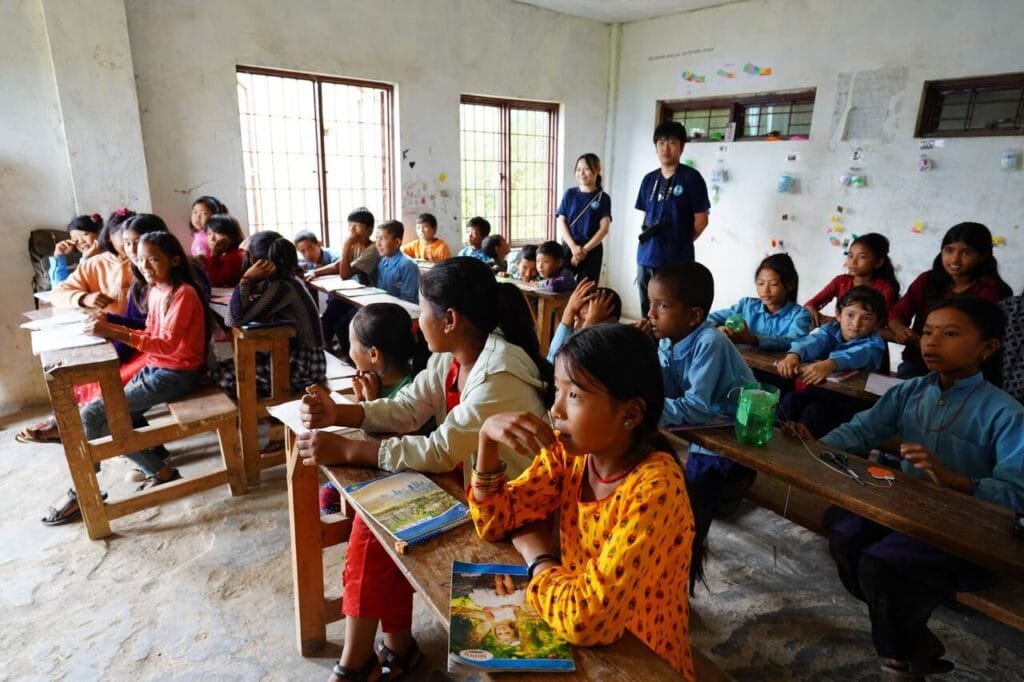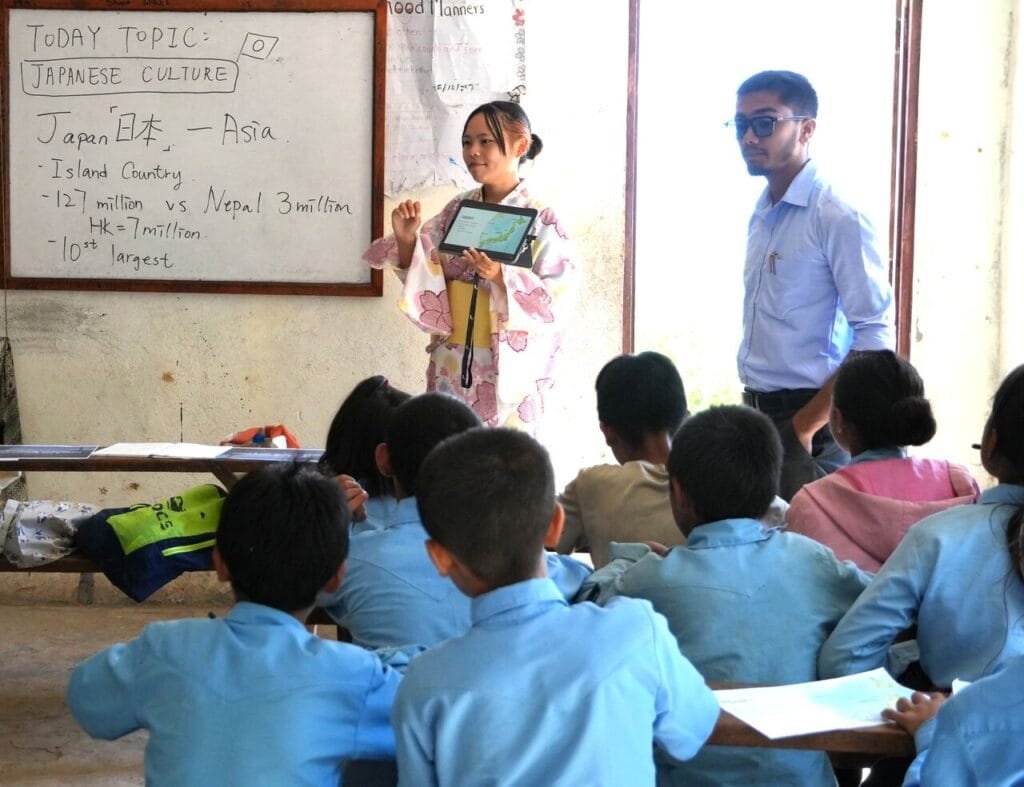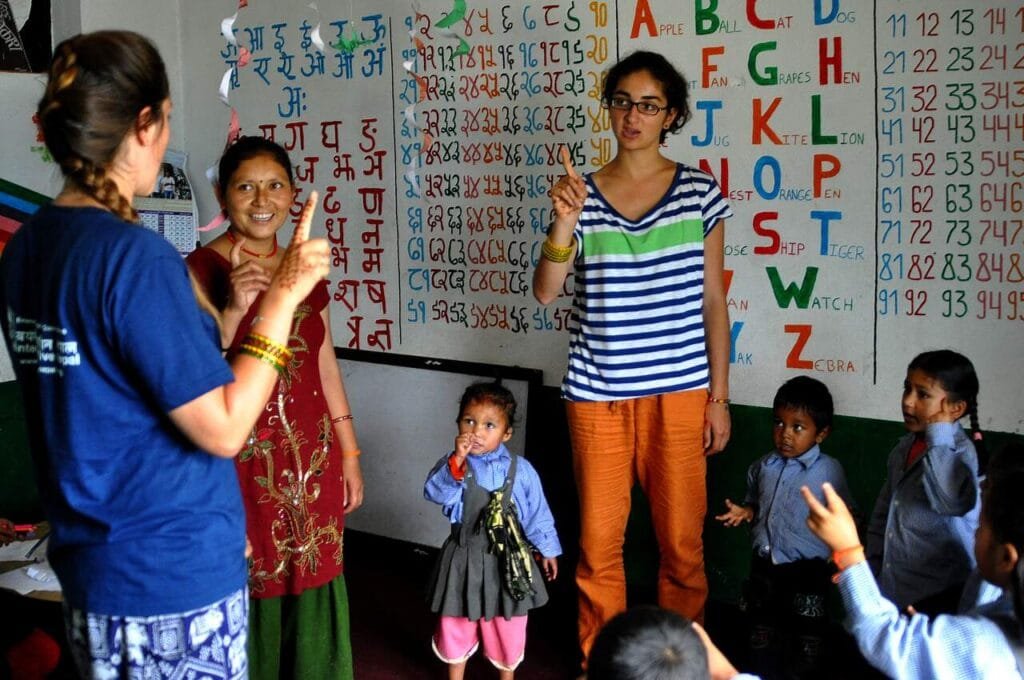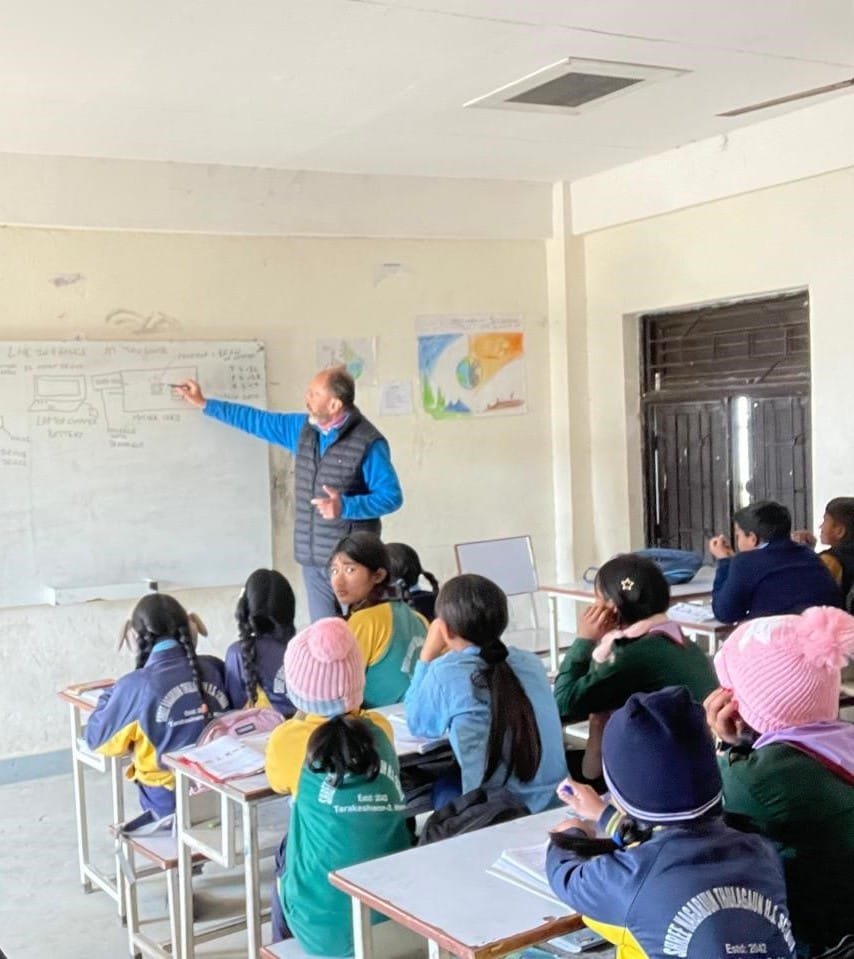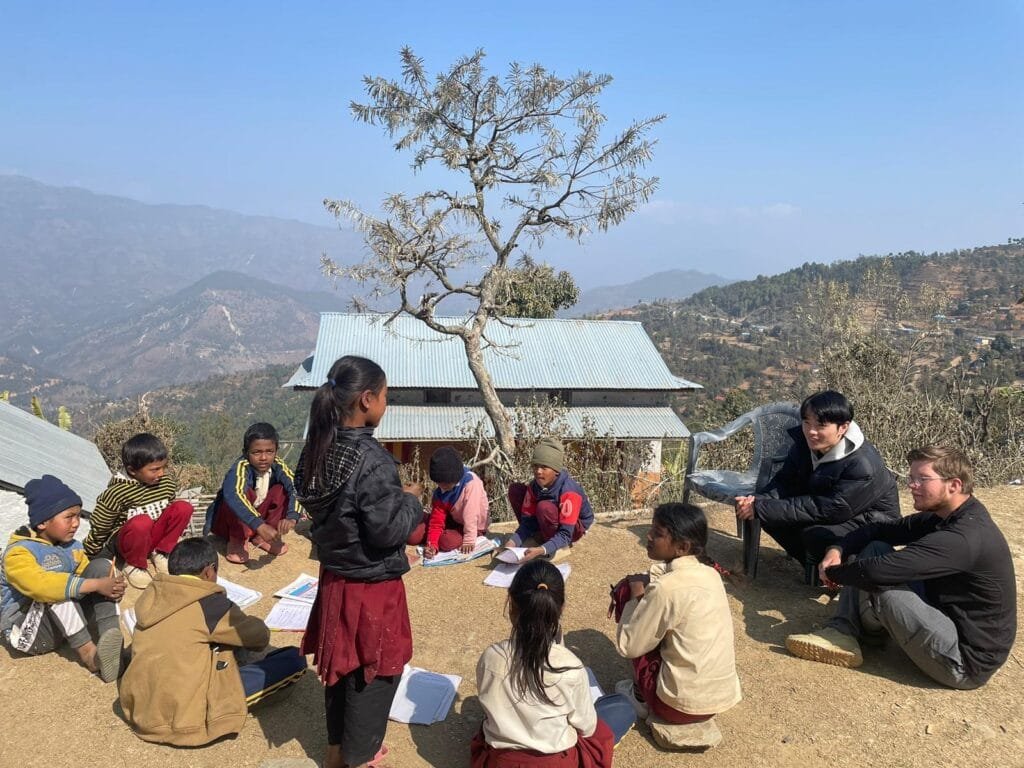Do you dream of positively impacting young minds while immersing yourself in a vibrant culture? Look no further than Teaching English in Public Schools across Nepal. When you teach English in public schools, you join a growing movement that provides high-quality education to children in under-resourced areas. By supporting English teaching in public schools, you play a critical role in boosting students’ confidence, improving their prospects, and shaping the nation’s future. Embrace this rewarding journey and discover how your teaching skills can leave a lasting impact on countless lives.
Overview
- Project Name: Empowering Students Through English Education
- Tagline: “Open Minds, Open Doors”
Through this volunteer initiative, you will have the chance to teach English in public schools throughout Nepal. Volunteers assist students in language acquisition and promote cultural exchange in collaboration with local administrators, teachers, and community members. This program seeks to enhance English proficiency among youth while broadening volunteers’ perspectives on Nepal’s diverse heritage.
Project Description
Introduction
“Language Bridges: Empowering Students Through English Education” focuses on improving language literacy in rural and semi-urban regions of Nepal. Volunteers assist school educators by introducing fresh teaching methodologies, cultural insights, and interactive lesson plans. The objective is to teach English in public schools in ways that resonate with local students, ensuring meaningful learning experiences. By blending traditional Nepali teaching styles with globally recognized practices, children gain essential skills to navigate modern challenges and opportunities.
Background
English instruction has long been valued in Nepal as a pathway to better employment, higher education, and international collaboration. However, public schools in rural or remote settings often lack trained English teachers, up-to-date materials, and consistent teaching resources. Class sizes can be large, and teachers sometimes struggle to meet each child’s learning needs. Nationally, the literacy rate has improved over recent decades, yet gaps remain, especially in public school English teaching. By volunteering, you help bridge these divides, directly impacting school performance and students’ prospects.
Key Objectives
Strengthen English Proficiency
- Implement engaging lessons, phonics drills, and language games that build foundational language skills.
- Familiarize students with common vocabulary, conversational phrases, and reading comprehension strategies.
Enrich Educational Resources
- Introduce innovative textbooks or supplementary materials.
- Provide digital teaching aids where feasible, enhancing modern literacy.
Support Local Educators
- Share best practices, co-develop lesson plans, and facilitate teacher professional development.
- Offer “train the trainer” sessions, empowering local staff to continue improvements post-project.
Public school English teaching efforts drive tangible progress by focusing on these objectives: improved communication, greater cultural awareness, and heightened student motivation for higher studies and future careers.
Why Volunteer for This Project
Empowering Students Through English Education
The Need
Nepal’s government prioritizes education as a vital tool for national development. Yet, rural schools frequently lack specialized English instructors. According to the Nepal Ministry of Education, some districts have teacher shortages exceeding 25%, and the teachers present often juggle multiple subjects. Additionally, many families see English proficiency as key to landing better jobs in tourism or abroad. By committing to teach English in public schools, you directly address staffing shortfalls and provide life-altering language skills to Nepal’s youth.
Global Relevance
This project aligns with the United Nations Sustainable Development Goals (SDGs), especially:
- SDG 4: Quality Education – ensuring inclusive, equitable education and promoting lifelong learning.
- SDG 8: Decent Work and Economic Growth – fostering practical language skills that help secure higher-paying jobs.
Your role in teaching English in state schools resonates globally, tying local needs to a broader mission of eradicating educational inequality. The cross-cultural exchange you foster broadens mutual understanding, bridging cultural gaps globally.
Local Voices
“We only had one English teacher for all grades. The volunteers brought fresh ideas and a fun environment to our classrooms. Students who barely spoke English now greet visitors confidently, and it’s wonderful!”
— Dipa, Primary School Teacher, Kavre
“English opens more doors for me. I can talk to tourists, read books, and dream of traveling for higher studies. Thank you, volunteers, for making classes interesting!”
— Santosh, Grade 8 Student, Nuwakot
Volunteers’ Roles and Responsibilities
As a volunteer, you’ll immerse yourself in public school English teaching while working closely with local educators. Below are core tasks, daily routines, and potential long-term projects for maximum impact.
10 Core Tasks
Conduct Interactive Lessons
- Design engaging activities to boost conversation skills.
- Use songs, storytelling, or roleplays that make English learning exciting.
Develop Lesson Plans
- Incorporate local culture and traditions into English lessons for a relatable context.
- Align with teaching English curriculum guidelines in public schools while promoting creativity.
Assess Student Progress
- Set simple quizzes or spoken tasks to gauge language proficiency.
- Work with teachers to record results and adjust teaching strategies.
Mentor Local Educators
- Share tips for teaching English in public schools, focusing on learner-centered methods.
- Encourage peer observations for ongoing professional development.
Organize Extracurricular Clubs
- Launch an English debate club, reading circles, or drama group.
- Provide space for students to practice spoken English outside formal classes.
Support Resource Management
- Create and maintain a small library or reading corner.
- Incorporate digital tools into teaching if the school has limited technology resources.
Conduct Workshops
- Offer training on effective English teaching strategies in public schools.
- Demonstrate interactive approaches, like group discussions or grammar games.
Promote Cross-Cultural Exchange
- Share stories about your home country, customs, and experiences.
- Learn about Nepali culture to integrate culturally responsive teaching methods.
Contribute to School Events
- Assist with exam proctoring, school festivals, or English language competitions.
- Encourage creativity, awarding small prizes for best effort.
Gather Impact Data
- Track improvements in test scores, attendance, or confidence levels.
- Provide structured feedback to local educators and project coordinators.
Daily Activities
A typical day in teaching English in public schools might look like:
- 08:30 – 09:15: Breakfast in your volunteer accommodation.
- 09:15 – 10:00: Commute or walk to the public school site.
- 10:00 – 13:00: Conduct classes focusing on reading comprehension or conversational skills.
- 13:00 – 14:00: Lunch break with local teachers or staff.
- 14:00 – 16:00: Assist with lesson planning, grade student work, or run after-school language clubs.
- 16:00 – 17:00: Return to your lodging. Debrief with coordinators or plan the next day’s lessons.
- 17:00 – Onwards: Cultural immersion, language practice, or free time.
Special Projects
In addition to daily instruction, volunteers may undertake unique or extended endeavors:
- Community English Workshops: Evenings or weekends for parents and local adults keen to learn basic English.
- Teacher Exchange Programs: Partner with neighboring schools for shared training and resource pooling.
- School Magazine or Newsletter: Encourage students to produce simple articles or stories in English, fostering creativity and writing skills.
Skills and Requirements
Required Skills
- Strong English Proficiency: Solid command of grammar, vocabulary, and conversational English.
- Adaptive Communication: Ability to break down complex language concepts for non-native speakers.
- Teamwork Mindset: Collaboration with local teachers, administrators, and volunteers is crucial.
Eligibility
- Age Requirement: At least 18; younger participants might join with guardian consent.
- Language Skills: Fluent English is mandatory for teaching English in state schools. Nepali is not required, though basic phrases can help.
- Commitment: Projects usually require a minimum stay of two weeks, with longer durations recommended for deeper involvement.
Preferred Skills
- Teaching Experience: Familiarity with English teaching certification for public schools can be an advantage, though not always compulsory.
- Cross-Cultural Competence: Openness toward cultural differences ensures smoother adaptation and effective teaching.
- Patience and Creativity: Encouraging younger learners and adapting to different skill levels demands both.
Cultural Experience
Cultural Immersion
Volunteering as a government school English teacher in Nepal extends beyond classroom lessons. Vibrant traditions, communal festivals, and warm hospitality will surround you. Whether tasting dal bhat at a local eatery or celebrating Dashain with a host family, each day immerses you in authentic Nepali life. This cultural exchange shapes not just students but volunteers as well, fostering empathy and global citizenship.
Language Learning
Nepal boasts a myriad of languages and dialects. Many volunteers take advantage of free Nepali language classes provided by local coordinators, picking up everyday greetings and basic conversational phrases. Knowing small Nepali expressions builds rapport with students and teachers, making classroom interactions smoother and more engaging.
Logistics and Support
Accommodation
- Shared Volunteer Houses: Ideal for bonding with fellow volunteers, typically located near school sites.
- Homestays: Live with a Nepali family, experiencing everyday customs and building deeper relationships.
- Basic Facilities: Comfortable beds, shared bathrooms, and communal spaces for discussion or lesson planning.
Meals
- Traditional Nepali Fare: Typically includes rice, lentil soup (dal), vegetable curries, and occasional meat.
- Dietary Flexibility: Vegetarian and vegan options can often be arranged with advance notice.
Transportation
- Airport Pickup: Program coordinators usually meet volunteers at Kathmandu’s Tribhuvan International Airport.
- Commutes: Depending on location, daily travel might involve public buses, minibuses, or short walks.
On-Site Support
The project’s local staff is equipped to assist with:
- Cultural orientation and language tips.
- Classroom management guidance, offering public school teaching English requirements insights.
- Health and safety protocols, including responding to any medical emergencies.
Health and Safety
- Vaccinations: Consult your healthcare provider regarding routine or recommended shots.
- Travel Insurance: Essential for covering medical or personal property issues abroad.
- Emergency Protocols: Coordinators maintain contact with local clinics or hospitals in case of urgent needs.
Program Fees and Inclusions
For specifics on volunteering costs, visit the Program Fees Page. Typically, fees cover:
- Accommodation and meals throughout your stay.
- Airport pickup and local orientation.
- Basic classroom materials and administrative expenses.
- Support from in-country coordinators, ensuring a safe, fulfilling volunteer experience.
Your financial contribution keeps the project sustainable, enabling continuous improvements to teaching English in public schools initiatives.
Impact and Outcomes
Volunteer Impact
By teaching English in public schools, you expand your worldview while refining key professional skills:
- Leadership and Teamwork: Organizing lessons, collaborating with teachers, and guiding students.
- Cross-Cultural Communication: Navigating language barriers fosters more profound understanding and respect.
- Educational Insight: Gaining hands-on knowledge of global academic settings, from resource constraints to local pedagogical methods.
Community Impact
- Improved Language Proficiency: Students become more comfortable speaking English, potentially enhancing job prospects.
- Enhanced Teaching Methods: Educators integrate newly learned techniques into future lessons.
- Elevated School Reputation: Schools that host volunteers often see higher enrollment and community support.
Success Stories and Testimonials
Volunteer Experiences
Alice, United Kingdom
“Nothing beats the moment when a shy student speaks up in English for the first time. That proud smile is priceless. My year volunteering as a government school English teacher was the most rewarding time I’ve ever spent.”
Raj, Australia
“Helping teachers create fun lesson plans was my favorite part. We turned grammar drills into short skits and vocabulary into board games. Seeing the kids laughing, learning, and improving simultaneously.”
Local Impact Stories
- Transforming Classroom Participation in Okhaldhunga
Volunteers introduced bilingual storybooks and reading circles. This approach propelled many initially hesitant students into active classroom participants. By the term’s end, average English test scores jumped by 20%. - Empowering Future Teachers in Chitwan
Inspired by the volunteers, some older students expressed interest in pursuing teaching as a career. A local scholarship fund was established, fueling the hopes of a new generation of passionate educators.
Application Process
Ready to inspire and empower? Follow these steps to join Language Bridges: Empowering Students Through English Education.
- Complete the Online Application
- Submit Your Resume: Attach your CV and two professional or academic references.
- Await Confirmation: Look out for a confirmation email with further instructions.
- Pay the Booking Fee: Secure your spot with a €150 program booking fee.
- Receive the Pre-Departure Pack: Get comprehensive guidelines, lesson planning tips, and cultural insights.
- Final Payment: Process the remaining program fee upon arrival or via bank transfer.
FAQs
Below are common questions regarding teaching English in public schools in Nepal. We’ve integrated relevant secondary and LSI keywords to provide clear, SEO-optimized answers.
- FAQ: What are the requirements for public schools teaching English in Nepal?
You generally need fluent English, a flexible attitude, and patience. Formal credentials like a TEFL/TESOL can help but aren’t always mandatory. Each school may have different criteria, so check program specifics. - FAQ: Is an English teaching certification for public schools necessary?
Not always, but it can boost your effectiveness in structured lessons. Credentials like CELTA or TEFL make lesson planning easier and demonstrate commitment to best practices. - FAQ: How do I teach English in public schools without prior experience?
Basic training, orientation from the program, and your passion can suffice. Local teachers often guide you on curriculum basics, and you’ll learn quickly through practical classroom experience. - FAQ: Are there English teacher jobs in public schools beyond volunteering?
Long-term opportunities exist, especially in private institutions, but official public teaching roles for foreigners can be limited. Volunteering is a direct route to gain experience while making an impact. - FAQ: Do I need to master the teaching English curriculum in public schools?
Familiarity helps, but local teachers typically provide the official syllabus. Volunteers add creative methods, ensuring lessons remain aligned with national standards yet engaging for students. - FAQ: What are tips for teaching English in public schools with limited resources?
Rely on improvisation: use simple flashcards, group discussions, or role-play scenarios. Incorporate local contexts and remain flexible, adapting to each class’s unique pace and needs. - FAQ: Is public school ESL teaching safe in rural Nepal?
Yes. Most volunteers find Nepal a welcoming, secure place. Coordinators have protocols for emergencies, and communities typically value your contribution and ensure a supportive environment.
Join Us Today to Make a Difference!
Your passion for education can reshape the futures of countless Nepali children. Teaching English in Public Schools is more than just a classroom assignment. It’s a chance to foster intercultural understanding, spur local development, and form friendships that transcend borders.
- Apply Now
- Contact Us: support@vin.org.np
- WhatsApp: +977 9851070477
Become part of a global family dedicated to enabling bright young minds. When you teach English in public schools, you light the path to lifelong opportunities—one lesson at a time.
Gallery
